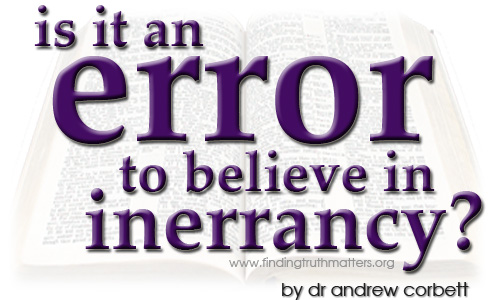
How seriously should we regard the Bible today? After all, in an age of such scientific certainty there appears to be many Biblical inaccuracies identified by scientists and historians to cast insoluble doubt on the preposterous claim that the Bible is the “word of God”. This has led some Seminaries (such as Fuller Theological Seminary) to abandon the belief that the Bible is “inerrant” (without error) in favour of a new belief that the Bible is “infallible” (correct in matters of religion only). It’s time now to examine this debate in closer detail.
 Both inerrancy and infallibility acknowledge that these concepts apply to the original manuscripts of the Bible – “the autographs” – not to any one particular copied manuscript or translation of the Bible. The issue of Biblical translation is linked to this debate and we’ll deal with it shortly. Inerrancy means without error. Infallible means cannot be wrong. At first glance it may appear that these words are saying the same thing. But this is how they are being distinguished:
Both inerrancy and infallibility acknowledge that these concepts apply to the original manuscripts of the Bible – “the autographs” – not to any one particular copied manuscript or translation of the Bible. The issue of Biblical translation is linked to this debate and we’ll deal with it shortly. Inerrancy means without error. Infallible means cannot be wrong. At first glance it may appear that these words are saying the same thing. But this is how they are being distinguished:
-
Inerrancy is the view that everything in the Bible is correct because it is inspired by God;
-
Infallibility is the view that the Bible is correct where it claims to be correct- namely in matters of theology (but not necessarily in matters or history or science).
The Bible claims that its contents are-
-
The Word of God (Matthew 15:6)
-
The Revelation of God (Rev. 1:1)
-
Inspired by God (2Tim. 3:16)
These self-descriptors seem to demand a view of Inerrancy rather than mere Infallibility. The Bible makes no concession that it is flawed or impaired when making scientific or historical statements.
Some people argue against Biblical inerrancy on the basis that the Bible contains historical and scientific statements that are not supported by the facts. The notoriously unreliable Wikipedia has an article on Biblical Inerrancy that makes the following assertion:
“Falsifiability” – Biblical inerrancy has also been criticised on the grounds that many statements about history or science that are found in Scripture may be demonstrated to be untenable. Inerrancy is argued to be a falsifiable proposition: if the Bible is found to contain any mistakes or contradictions, the proposition has been refuted. Opinion is divided over which parts of the Bible are trustworthy in the light of these considerations. Radical theologians answer that the Bible contains at least two divergent views of the nature of God: a bloody tribal deity [Joshua 10:11] or a loving father. [Psalm 103:11-13] The choice of which material to value can be based on that which is found to be intellectually coherent and morally challenging, and this is given priority over other teaching found in books of the Bible. [John Hick – What does the Bible really say?]
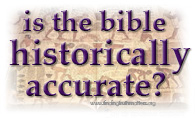 Curiously though, the author of the Wikipedia article doesn’t offer any examples of what they consider to be “untenable”, “mistakes”, or “contradictions.” When promoters of this view do venture to offer such examples it soon becomes apparent that their examples are “straw-men” (not real). For example, the Israelite exodus has been held up as an example of historical error in the Bible. The intensity of this claim ranges from the accusation that none of the Book of Exodus occurred (that is, no Hebrew enslavement, no Moses, no plagues, no exile, no parting of the waters, no Sinai law-giving, and no wilderness wandering), to: some of the facts of Exodus may be legendary (that is, the accounts in the Book of Exodus are an exaggeration of what happened).
Curiously though, the author of the Wikipedia article doesn’t offer any examples of what they consider to be “untenable”, “mistakes”, or “contradictions.” When promoters of this view do venture to offer such examples it soon becomes apparent that their examples are “straw-men” (not real). For example, the Israelite exodus has been held up as an example of historical error in the Bible. The intensity of this claim ranges from the accusation that none of the Book of Exodus occurred (that is, no Hebrew enslavement, no Moses, no plagues, no exile, no parting of the waters, no Sinai law-giving, and no wilderness wandering), to: some of the facts of Exodus may be legendary (that is, the accounts in the Book of Exodus are an exaggeration of what happened).
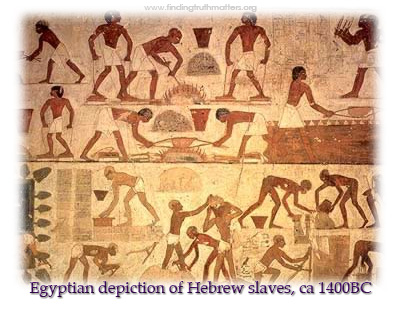
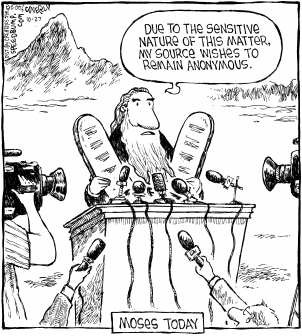 The Exodus presents some of the most difficult challenges for those holding to the Bible’s inerrancy. While there is more than sufficient historical data for most of the post-Flood Biblical narrative, there is scant extra-biblical historical data for the details of the Exodus. There even appears to be historically contradictory data to the Exodus. This is the observation conceded by those who hold to the Infallibility of the Bible rather than its Inerrancy. That is, those who hold to the absolute truthfulness of the Bible in matters of theology, faith, religion, morality and ethics feel the need to concede that the Bible may be inaccurate when it comes to matters of history or science – and the accounts in the Book of Exodus are a classic case in point.
The Exodus presents some of the most difficult challenges for those holding to the Bible’s inerrancy. While there is more than sufficient historical data for most of the post-Flood Biblical narrative, there is scant extra-biblical historical data for the details of the Exodus. There even appears to be historically contradictory data to the Exodus. This is the observation conceded by those who hold to the Infallibility of the Bible rather than its Inerrancy. That is, those who hold to the absolute truthfulness of the Bible in matters of theology, faith, religion, morality and ethics feel the need to concede that the Bible may be inaccurate when it comes to matters of history or science – and the accounts in the Book of Exodus are a classic case in point.
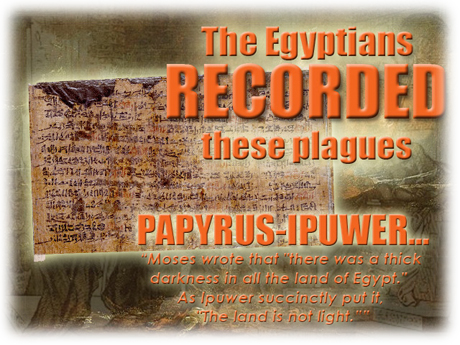
But each of the historical problems (the date of the Exodus, the name of the Egyptian city being constructed by the slaves, the identity of the Pharaoh, the number of Hebrews enslaved and the location of the river crossing) have very reasonable solutions which cause the alleged historical contradictions to at least be adequately challenged and even to be dismissed. If the existing trend in archaeology continues we can expect the discovery of new historical data to shed further extra-biblical support for the Scriptural account of the exodus. From the growing body archaeological data we now know that there were indeed Hebrew slaves in Egypt around the time of the exodus, there was a series of inexplicable plagues, there was a mass migration of these slaves, and that the Egyptian historians were very selective in what aspects of history they chose to record and the manner in which they did (as the recent discovery and study of the Papyrus-Ipuwer reveals).
“It may be stated categorically that no archaeological discovery has ever controverted a biblical reference.”
Professor Nelson Gleuk, renowned Jewish Archaeologist, “Rivers In The Desert; History of the Negev“, 1969:31
“There can be no doubt that archaeology has confirmed the substantial historicity of the Old Testament tradition.”
Professor William Albright, “Archaeology and the Religions of Israel“, 1956:176
Therefore, those who have abandoned Biblical Inerrancy and adopted the fall-back position of Biblical Infallibility may have jumped too soon!
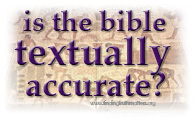 If the Bible is textually flawed then it logically can not be inerrant. One of the noisiest new-atheists is Bart Ehrman. He once looked like an Evangelical but claims to have abandoned his belief in God because he saw too many inaccuracies in the Bible. He throws out an oft-unchallenged assertion that the Bible contains over 200,000 textual errors and that no two ancient manuscripts of the Scriptures exactly agree. But this is a very flimsy argument against Biblical inerrancy-
If the Bible is textually flawed then it logically can not be inerrant. One of the noisiest new-atheists is Bart Ehrman. He once looked like an Evangelical but claims to have abandoned his belief in God because he saw too many inaccuracies in the Bible. He throws out an oft-unchallenged assertion that the Bible contains over 200,000 textual errors and that no two ancient manuscripts of the Scriptures exactly agree. But this is a very flimsy argument against Biblical inerrancy-
“There is an ambiguity in saying there are some 200,000 variants in the existing manuscripts of the New Testament, since these represent only 10,000 places in the New Testament. If one single word is misspelled in 3,000 different manuscripts, this is counted as 3,000 variants or readings.”
Norman Geisler & William Nix, “A General Introduction To The Bible”, Moody Press, Chicago, 1968:361
 The Bible seems to make some very straightforward scientific statements which increasingly align with what we are now discovering through the scientific method. These Biblical statements are also falsifiable (that is, its claims can at least be demonstrated to be true or false). For example, God’s reply to Job is saturated in scientific statements. Of the 66 questions or so that the LORD asked Job, today we can only answer about 9 of them with any degree of scientific certainty!
The Bible seems to make some very straightforward scientific statements which increasingly align with what we are now discovering through the scientific method. These Biblical statements are also falsifiable (that is, its claims can at least be demonstrated to be true or false). For example, God’s reply to Job is saturated in scientific statements. Of the 66 questions or so that the LORD asked Job, today we can only answer about 9 of them with any degree of scientific certainty!
“But philosophers of science during the second half of the twentieth century came to realize that the whole scientific enterprise is based on certain assumptions that cannot be proved scientifically, but that are guaranteed by the Christian worldview: for example, the laws of logic, the orderly nature of the external world, the reliability of our cognitive faculties in knowing the world, the validity of inductive reasoning, and the objectivity of the moral values used in science.”
Dr. William Lane Craig, Essay: “Tough Questions About Science” Zondervan, 2003:50-51
There are some Christians who have imposed faulty science onto the pages of Scripture and when their science is shown up for what it is – faulty – it has caused skeptics to denounce the claim that the Bible is therefore inerrant. A group of Christians around the turn of the twentieth century formed a movement known as “Fundamentalism” in which they claimed that the Bible must always be taken “literally”. The Fundamentalist then promoted this concept of wooden-literalism by making some astonishing claims about what the Bible taught.
For example, based on the flawed work of the 16th century Bishop, Ussher, who had calculated that the date of Genesis 1:1 was 4004BC (based on his genealogical math of the Bible). But Bishop Ussher had made a fundamental error in his calculations which most Fundamentalists didn’t realise. He omitted potentially tens of thousands of years from his genealogical calculations! Fundamentalists also took a very wooden-literal approach to the Hebrew word “yom” used in Genesis 1. They claimed that this word should always be understood as “24 hours”. They failed to realise that the Bible uses this word (Hebrew: ‘yom’) in several ways depending on the context. For example, in Genesis 2:4 the entire “week” of creation is described with this Hebrew word yom.
This insistence by Fundamentalists that the earth (and cosmos) is only a few thousand years old and that it was formed in six, consecutive, 24-hour periods flies in the face of what we know to be scientifically true. This has led to people, even scientifically-knowledgeable Christians, concluding that the Bible is flawed when it comes to its scientific statements.
Again, those who fall back to Biblical infallibility may have retreated too early. There is a ministry forum for Christians who regard the Scriptures as being inerrant even when it comes to matters of science- Reasons To Believe. and I strongly recommend the website to the scientifically literate Christian and even sceptic-

According to the controversial liberal Bishop, John Shelby Spong, the doctrine of biblical inerrancy has been a historical substitute for papal infallibility-
“When Martin Luther countered the authority of the infallible pope, he did so in the name of his new authority, the infallible Scriptures. This point of view was generally embraced by all of the Reformation churches. The Bible thus became the paper pope of Protestantism.”
John Shelby Spong
[http://www.religion-online.org/showarticle.asp?title=1686]
The problem with this kind of statement is twofold. Firstly, even the Roman Catholic Church holds to the inerrancy of the Scriptures. That is, the Reformers were not introducing the concept- they were actually endorsing it! Secondly, the Reformers were re-asserting the claims of the Bible itself – not inventing it – that it is inspired by God and without error.
This God—his way is perfect;
the word of the LORD proves true;
He is a shield for all those who take refuge in Him.
Second Samuel 22:31 ESV
Every word of God proves true;
Proverbs 30:5a ESV
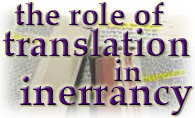 Finally, some feel that Inerrancy is an untenable position since there are so many translations of the Bible which differ in their renderings that this logically means that we cannot claim that the Bible is Inerrant (since presumably they would all render the manuscripts identically).
Finally, some feel that Inerrancy is an untenable position since there are so many translations of the Bible which differ in their renderings that this logically means that we cannot claim that the Bible is Inerrant (since presumably they would all render the manuscripts identically).
To understand the role of Bible translation I recommend an eBook that I have written on the subject, called- “Which Translation?” But it would be helpful to have an understanding of how God inspired the pen-men of the Bible.
Muslims hold to the belief that their Qur’an was given by Allah through Mechanical Dictation. That is, they believe Allah dictated every word to Mohammed. Some Christians promote a similar idea about the Christian Bible. But the Bible indicates that God inspired men to write His message inerrantly through their own vocabulary and experience. This is called ‘Plenary Inspiration.’
The argument that multiple Bible translations disproves Biblical Inerrancy is based on a myth. It is a myth that different translations of the Bible render the Biblical manuscripts in wildly different fashions. It is advisable for the Bible student to use a good translation of the Bible (such as the NASB, NKJV, NIV or especially the ESV which I strongly recommend) rather than a paraphrase of it (such as the Living Bible, Good News Bible, or Message). Modern translations of the Bible, such as the ones just referred to, give readers a good sense of the Word of God.
Not only can we have good confidence in the inerrancy of the Bible, we should have confidence in it. This is the sentiment expressed as a result of a gathering of Church leaders and Theologians at the Hyatt Regency O’Hare, Chicago in 1978, sponsored by the International Council on Biblical Inerrancy, where over 300 noted evangelical scholars, including- James Boice, Norman L. Geisler, John Gerstner, Carl F. H. Henry, John Warwick Montgomery, J. I. Packer, Earl Radmacher, Francis Schaeffer, R. C. Sproul, and John Wenham, who concluded that holding to the Inerrancy of the Bible is vital-
“The authority of Scripture is inescapably impaired if this total divine inerrancy is in any way limited or disregarded, or made relative to a view of truth contrary to the Bible’s own; and such lapses bring serious loss to both the individual and the church.”
THE CHICAGO STATEMENT ON BIBLICAL INERRANCY, 1978
While it’s true that all Christian Fundamentalists hold to the Inerrancy of the Bible, it is not true that all those who hold to the Inerrancy of the Bible are Christian Fundamentalists. Christian Fundamentalists hold to their concept of Biblical Inerrancy despite science and history often not supporting their interpretations of the Bible. This leads them to defend Biblical Inerrancy with a philosophy that the Bible is uniquely true – that is, where scientific or historical data does not confirm their interpretations of the Bible we are to regard the extra-biblical data as untrue. But this disagrees with what the Bible itself says. It repeatedly claims that it is true and that the truth can be tested, falsified, evidenced, and even experienced. That is, all truth is God’s truth, wherever it may be found. This sentiment about the unique authority of the Bible and the extra-Biblical (general) revelation of God’s truth is contained in the Belgic Confession.
Therefore, in light of the growing body of scientific and historical data we can be confident that the inerrant truthfulness of the Bible will increasingly be confirmed. However, this may present some serious challenges to the unsustainable interpretations of Christian Fundamentalists just as the Vatican itself discovered a few centuries ago when it took a “Fundamentalist” approach to the assertions of Galileo and Copernicus.
Amen.
© Dr. Andrew Corbett, 4th April 2008, Legana, Tasmania, Australia
__________
-
Sale!
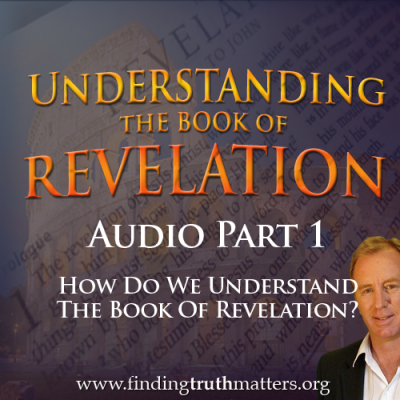
Understand The Book Of Revelation, Part 1 (Radio Edition)
Original price was: $1.25.$0.00Current price is: $0.00. -
Sale!

Living By Virtue, Part 4 – By Virtue of Generosity
Original price was: $1.25.$0.00Current price is: $0.00. -
Sale!
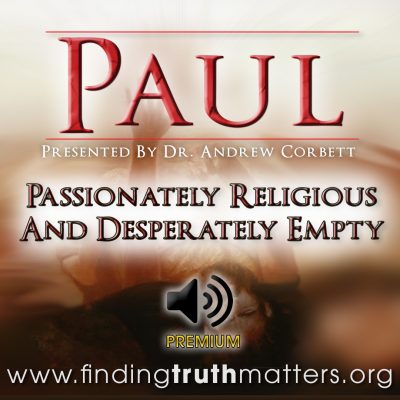
Paul Part 1, Premium Audio
Original price was: $1.75.$0.00Current price is: $0.00. -
Sale!
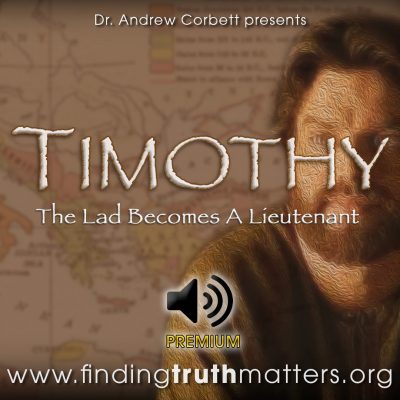
Timothy Part 2, Premium Audio
Original price was: $1.75.$0.00Current price is: $0.00.








































0 Comments